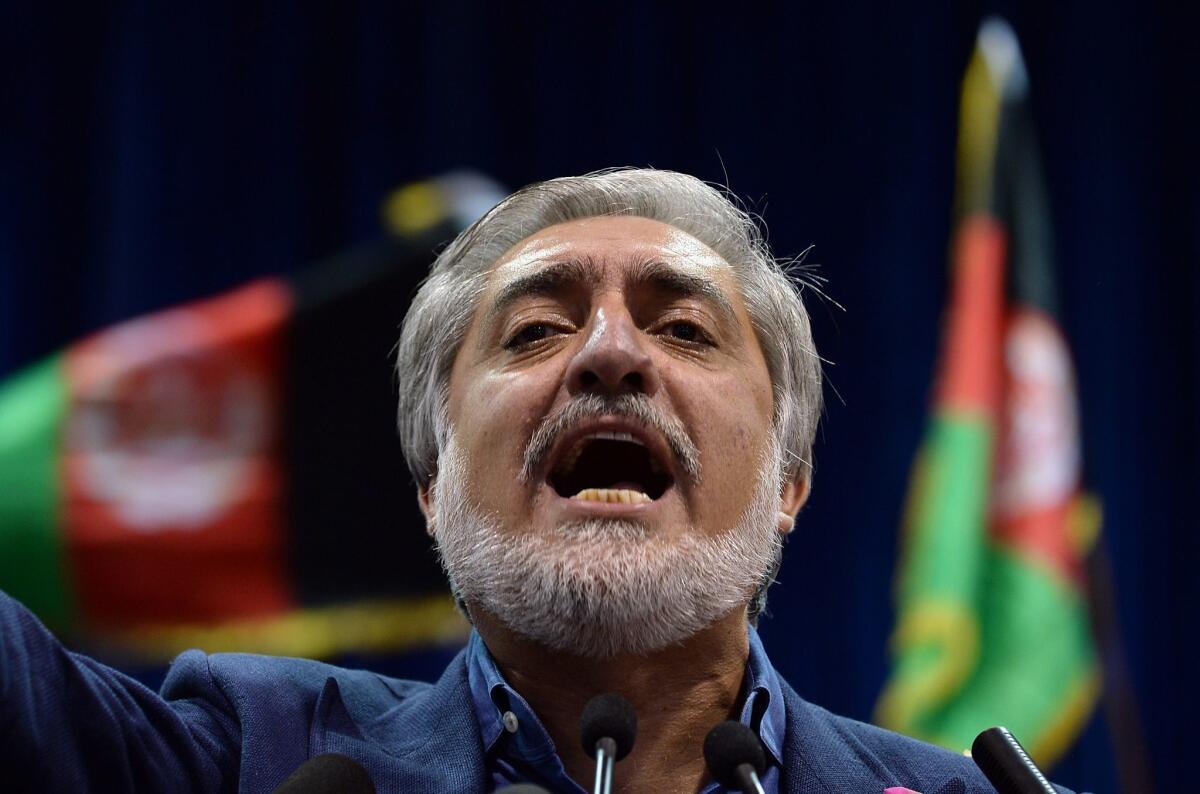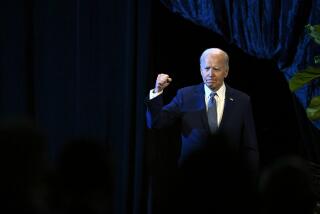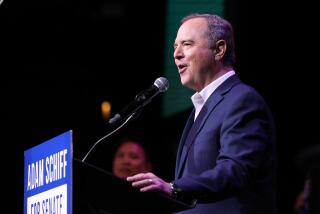Abdullah threatens to back out of Afghanistan election

- Share via
Reporting from Kabul, Afghanistan — The campaign team of Abdullah Abdullah, the former foreign minister running against Ashraf Ghani Ahmadzai for the presidency of Afghanistan, has issued a 24-hour notice to the United Nations and international observers that if changes are not made to processes in the ongoing audit of all 8 million votes cast in the second round of the election, they will back out of the election process entirely.
“We will give one day to the international community to review and assure that the vote auditing and the political negotiations are moving forward properly. ... If our demands are not met and the auditing not conducted legitimately and the political talks without honesty, then we will withdraw from both processes,” said Abdullah spokesman Syed Fazel Sancharaki.
The Monday afternoon warning came a week after the team of Reform and Partnership, as Abdullah’s campaign refers to itself, backed out of the audit claiming their concerns about widespread fraud in the June 14 runoff were ignored by the United Nations.
“From the beginning we were willing to join the audit because we thought it would lead to the separation of clean and fraudulent votes. That’s what we were working toward,” Muslim Saadat, a spokesman for the Abdullah campaign, told The Times last week, after the Reform and Partnership team backed out of the audit.
If followed through, Monday’s warning would mark the fourth and presumably final time the Reform and Partnership team has backed out of the election process since the second round in June.
What sets Monday’s threat apart from prior boycotts is that for the first time since Abdullah and Ghani first pledged to form a government of national unity per the audit result, the Reform and Partnership team has threatened to walk away from the political process that was intended to be carried out in parallel with the technical audit process.
Sancharaki said his team would “form a national unity government only when all the results are finalized” and fraudulent votes are separated from clean ones.
That political process included negotiations on dividing responsibilities and posts of the potential unity government.
The threat to back out of the political negotiations is seen as a formidable shift among the Abdullah camp.
Speaking to The Times last week, Saadat said that with the exception of a couple of points, which had been referred to the candidates themselves, the political process had been “mostly on track.” The technical side, however, including criteria for the invalidation of votes, “saw consistent blocks along the way,” Saadat said.
Referring to a “triangle of fraud” comprised of the presidential palace, the Independent Election Commission and the Ghani campaign, representatives of the Abdullah team presented evidence of what they said were 1.5 million questionable result sheets spanning several districts.
Most notably, the Reform and Partnership team showed examples of what they said were result sheets from 2,200 polling stations that showed nearly 100% of the votes for Ghani, featured similar handwriting and were signed by a single person.
On sheets having signatures by Abdullah campaign observers, a representative from the Reform and Partnership team said, votes for Abdullah were entirely absent.
“That means the Abdullah team observer could sign, but not vote,” the representative said.
Sources speaking to The Times said Monday’s threat of withdrawal from the political process may be a sign of disunity among the Reform and Partnership team.
The most divisive figures, said sources speaking on condition of anonymity, remain Mohammad Mohaqiq, the Hazara warlord running as Abdullah’s second vice president, and Atta Muhammad Nur, the governor of northern Balkh province.
Nur, who had previously warned of nationwide unrest if Abdullah lost the presidential vote in a fraudulent ballot, issued a similar warning on his Facebook page shortly after the news conference:
“It is to be noted that the national and international institutions would be accountable for any consequences, despite our previous warnings, which have been ignored by them. Those who ridiculed the election process with industrial-scale fraud and are attempting to grab power by legitimizing their frauds would be accountable.”
Monday’s threat came 24 hours before the date Hamid Karzai, the incumbent, had hoped the new president would be inaugurated after the initial Aug. 2 date for that event was pushed back to accommodate the audit.
In a statement to the media, Aimal Faizi, presidential palace spokesman, tried to ease fears that Karzai would vacate his post prior to a resolution of the election deadlock: “The President is not considering the step down before the official transfer of power to the new Afghan President. It is unconstitutional to step down before officially transferring the power to his successor.”
International and domestic election watchers had hoped the matter would be resolved before a NATO conference was scheduled to begin Thrusday in Wales. If no president is elected by that time, Bismillah Khan Mohammadi, defense minister, would attend as the Afghan representative.
Latifi is a special correspondent.
More to Read
Sign up for Essential California
The most important California stories and recommendations in your inbox every morning.
You may occasionally receive promotional content from the Los Angeles Times.













